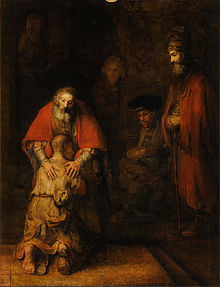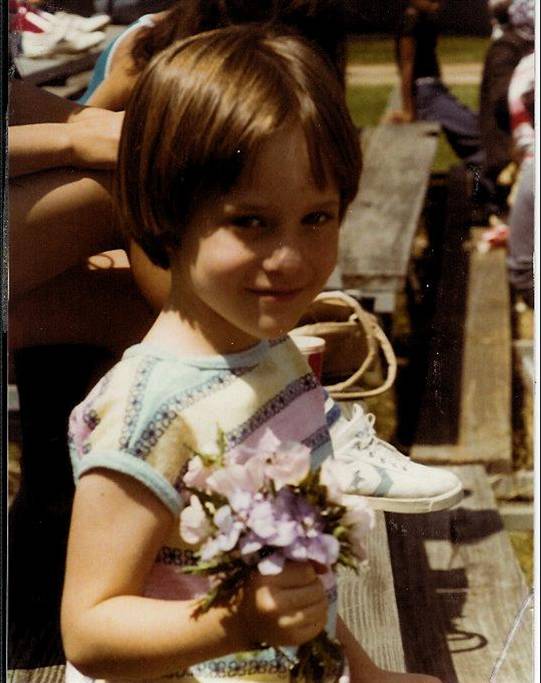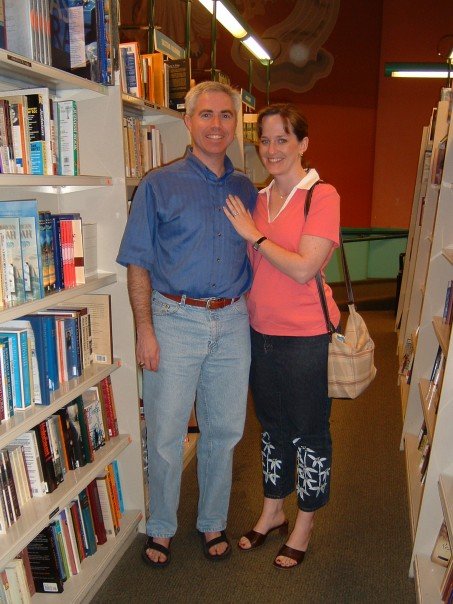In my grandparents’ sitting room were several large photo albums containing yellowed black-and-white pictures. Those albums also contained something more intangible: stories. If I sat with my grandmother with the albums open on her lap, she would turn the pages and tell me stories about these strangers who were actually relatives I had never met.
The stories those albums contained were from another era, but they always felt familiar—like the story about my grandfather’s brother feeding a pig so much buttermilk that it was found belly-up the next morning; or the story of how my grandfather asked for my grandmother’s hand in marriage by sitting awkwardly with her family all afternoon, with everyone knowing exactly why he was there, until he finally blurted out, “Well, I’m taking your daughter.”
After years of hearing those stories, I could repeat them as though I had been there in person, when in reality most of them happened long before I was born.
In the same way, God’s people have long held onto their heritage through the stories found in Scripture. By telling and retelling them, we have found an identity that started long before our stories on earth began.
Jesus had a way of rewriting the script of those old stories to give those who were listening new insight into both their own identity and God’s character. Jesus once told a story that seemed very familiar to those who heard it because it sounded so much like the story of the reconciliation between Jacob and Esau. While the story of Jacob and Esau is a true story about historical persons and Jesus’ parable uses fictional characters to make a point, a comparison of the two stories has some interesting lessons to teach us.
Let’s look together at the similarities and differences between the story that Jesus told and the closing of Jacob and Esau’s fraternal conflict. We’ll consider how they are alike, how they are different, and what Jesus was doing by changing the original story for new hearers. We may discover what Jesus wants us, the hearers of both stories, to apply to our own lives.
The last time we saw Jacob, he was at the bedside of his dying father, taking the last part of an inheritance that was not his, the blessing. Because of Esau’s rage Jacob has to immediately flee to a distant land to stay with relatives. It’s no wonder that, years later, Jacob is hesitant to burst in the door of his childhood home and announce his return. There is no way of knowing the extent of Esau’s anger or how he might take revenge.
The story was well-known to Jewish believers, who would have shaken their heads at Jacob’s deviousness each time they heard it. Although they knew Jacob had questionable beginnings, they also identified him as a patriarch of their faith. Jacob’s new name came to describe the entire family: the nation of Israel. They took great pride in the stories that marked their spiritual pedigree.
Once Jesus was in conversation with a group of Jewish leaders who were criticizing Him. Instead of responding to their argument with an argument, Jesus started telling stories. Jesus was a master storyteller and held the crowd spellbound with a captivating story about a father and two sons. The story begins with a family drama over inheritance.
Those who listened to Jesus tell this story would have immediately recognized some of the echoes of Jacob and Esau’s story. Both focus on family betrayal and the resulting conflict between two sons. In both, the younger son shocks the family by prizing his inheritance over his family and then running away to a far country.
There is also a notable difference between the two stories. Jacob’s ultimate betrayal, the theft of his brother’s birthright, occurred at his father’s supposed deathbed—although Isaac ended up living longer (Genesis 35:28-29). Such an act of deception was a low-down, dirty trick to play on an elderly father who was sick and blind. But in Jesus’ story, the younger son demands his part of the inheritance while his father is still alive and healthy. To the hearers of the story, this was a shocking plot twist. Basically, the younger son is saying that he wishes his father were dead and that all his family is good for is to give him the money he desires. He then leaves home for a “far country” to spend it all on shameful pursuits.
In both Jacob’s true life story and the story Jesus told about the prodigal, the younger sons:
receive their inheritance through dishonorable means,
run away and seek happiness elsewhere,
forfeit their ill-gotten inheritance—Jacob because he is not home to enjoy what is now his, and the prodigal because it has all been spent,
care for livestock while they are away from home (Jacob’s care of his uncle Laban’s goats leads to a new collection of assets—livestock of his own—while the prodigal’s occupation of caring for pigs, which were considered unclean by the Jews, is a true sign of his desperation), and
reach a breaking point and decide to return home.
 Despite their apprehension in returning home, both younger sons are welcomed with open arms. However, it’s here that the stories diverge, because the welcoming character in the prodigal story is the father while the welcoming character in Jacob’s story is his brother, Esau.
Despite their apprehension in returning home, both younger sons are welcomed with open arms. However, it’s here that the stories diverge, because the welcoming character in the prodigal story is the father while the welcoming character in Jacob’s story is his brother, Esau.
During his journey home, Jacob learns that his brother, Esau, is coming on the road to meet him accompanied by four hundred men. This sounds more like a war party than a welcoming party. Now, for the first time, instead of grasping other people’s gifts, Jacob becomes a giver and sends gifts ahead to Esau as a peace offering.
The prodigal son travels home empty-handed with his tail tucked between his legs. Like Jacob, he wonders what kind of reception he will receive at home. Before he even reaches the house, however, his father sees him from a long way off and runs to meet him. The prodigal has prepared a speech asking to be given a position as a servant, but the father will hear nothing of it. He welcomes his younger son unconditionally and lavishes him with gifts to celebrate his return, once again marking him as a son and an heir.
Although Jacob approaches with gifts and the prodigal has none, in both of their stories we see that welcome is not based on worthiness. In fact, one of the most beautiful parallels between the two stories is the reception the two young men receive from their relative.
These are the only two places in Scripture where we find this exact description of running toward someone, throwing arms around him, and kissing him. The similarity between the stories, while implicit until now, becomes undeniably strong at this point. Those listening to Jesus’ story would have noticed a very clear connection and leaned in closer to hear how Jesus would resolve the story.
The father in the prodigal story is clearly meant to mirror our Heavenly Father, who eagerly awaits our return when we stray from Him and accepts us just as we are.
God reveals himself in the faces of those who offer forgiveness. When we are called to forgive others, our actions can reflect God’s face and God’s love. If we exhibit resentment and bitterness toward those who have wronged us or toward our heavenly Father, we are more like the older brother in the prodigal story who returned home angry that his brother had received what he did not deserve, and who was unwilling to offer forgiveness and grace.
As Jesus’ story ended, his listeners may have realized that they were being cast in an unflattering role. While historically they had identified themselves with Jacob, the one called Israel who became the father of a great people, in Jesus’ story they were the older brother, resentful that Jesus would welcome those who had lived lives of disobedience.
The father figures in these two stories are very different. Jacob’s father, Isaac, has always been aloof and detached. Easily fooled, he gives away the blessing to the wrong son; then when Esau asks for a different blessing, he proclaims a shortage of blessing: there is not enough to go around.
The prodigal’s father, in contrast, cannot be manipulated or bought by his son’s bargaining tactics. Instead, he gives away his wealth freely when asked, and he gives his blessing upon his son’s return.
A final comparison has to do with a statement in each story that indicates an attitude toward blessing. In Jacob’s story, when he is returning home, his uncle Laban surveys the livestock he is taking with him and declares: “All you see is mine” (Genesis 31:43). The attitude expressed here is one of lack or insufficiency. Yet in Jesus’ story, when the older son confronts his father about why the younger, misbehaving son is receiving special treatment, the father proclaims: “All I have is yours!” (Luke 15:33). The father reminds the older brother that there is more than enough blessing for both of his sons, more than enough to satisfy all of their needs.
These two stories help identify two roles we often find in our own family stories: the one who breaks away from the family and is in need of someone to welcome her or him back home, and the one who remains faithfully at home and serves but holds resentment toward others in the family who are not serving.
While Jacob and Esau’s story is resolved with the reconciliation between the brothers, Jesus’ parable is open-ended, allowing His listeners to finish the story. He seems to ask his listeners, What will you do? How will you respond to the grace offered so freely not only to you but to anyone who wants to run into the open and waiting arms of the Father?
How about you? How will you respond when God declares, “All that is mine is yours”? There is plenty to go around. Plenty for all. Plenty of love, plenty of forgiveness, plenty of grace.


 Despite their apprehension in returning home, both younger sons are welcomed with open arms. However, it’s here that the stories diverge, because the welcoming character in the prodigal story is the father while the welcoming character in Jacob’s story is his brother, Esau.
Despite their apprehension in returning home, both younger sons are welcomed with open arms. However, it’s here that the stories diverge, because the welcoming character in the prodigal story is the father while the welcoming character in Jacob’s story is his brother, Esau. When I read Genesis 25, I think that Rebekah and Isaac must have felt as ill prepared as any first-time parents. They had waited so long for these twin babies through the grueling journey of infertility. Rebekah’s pregnancy was so difficult that she cried out to God, asking Him what was going on within her.
When I read Genesis 25, I think that Rebekah and Isaac must have felt as ill prepared as any first-time parents. They had waited so long for these twin babies through the grueling journey of infertility. Rebekah’s pregnancy was so difficult that she cried out to God, asking Him what was going on within her. desire was to become a mom, but my body just wasn’t cooperating. After a couple of years in the waiting room of my regular OBGYN, I moved on to the bigger and more expensive waiting room of a specialist, and a lab, and an operating room, and lots of other places where it seemed like all I could do was . . . wait.
desire was to become a mom, but my body just wasn’t cooperating. After a couple of years in the waiting room of my regular OBGYN, I moved on to the bigger and more expensive waiting room of a specialist, and a lab, and an operating room, and lots of other places where it seemed like all I could do was . . . wait.



